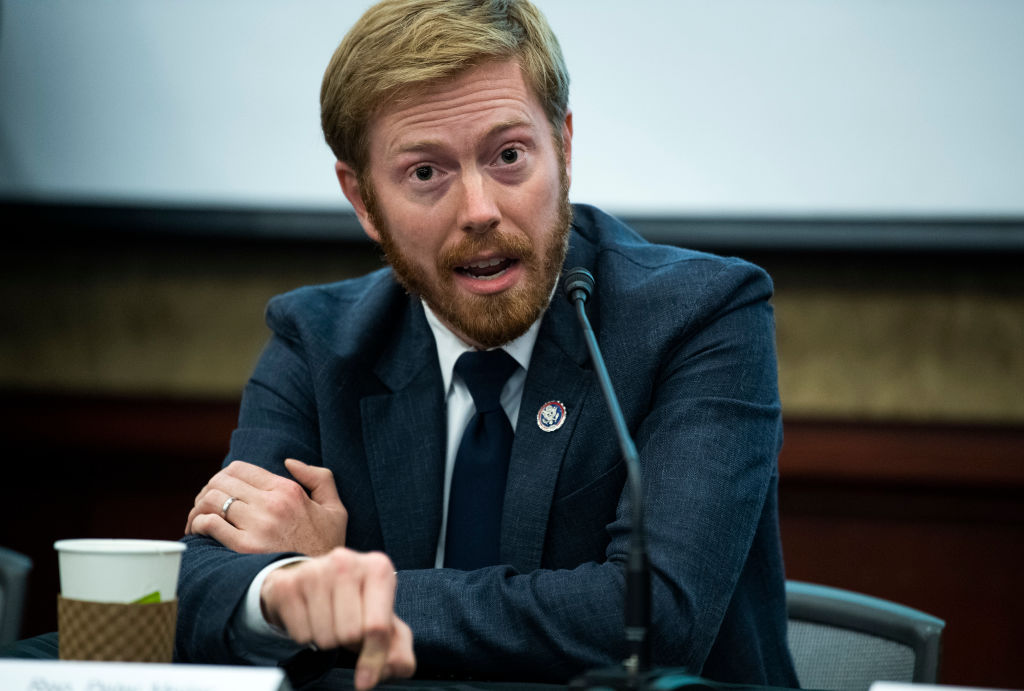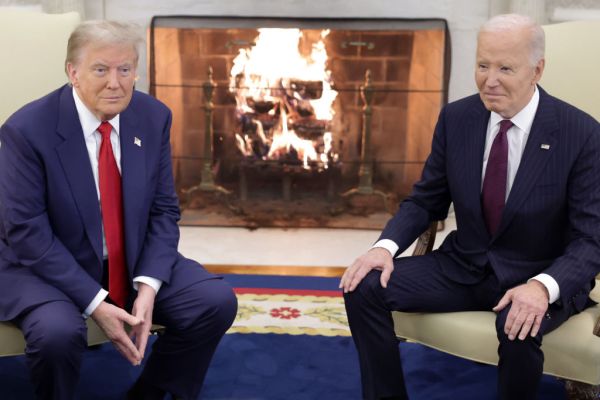Happy Monday! At a time when partisan bickering dominates political headlines, we’ll try to highlight flashes of bipartisanship in Washington when we can. Last week, Democratic Rep. Mary Peltola announced that one of her former Republican opponents, Josh Revak, will join her Alaska office as state director. “We may have different party affiliations, but the job is about serving all Alaskans,” Revak said in a statement, according to the Anchorage Daily News.
Up to Speed
- President Joe Biden will deliver his second State of the Union address at the Capitol Tuesday night, in a speech that is expected to also preview the themes of his likely reelection campaign.
- The Democratic National Committee this weekend officially approved its new primary schedule for the 2024 presidential election—demoting the Iowa caucuses, moving South Carolina to the head of the queue, and shuffling a handful of other early states, including New Hampshire, Georgia, Nevada, and Michigan. As we wrote last week, some GOP-led states do not intend to comply with the new DNC calendar, setting up a clash between national Democrats and state parties in Iowa and New Hampshire.
- The Federal Election Commission (FEC) increased individual contribution limits for the 2023-2024 cycle, adjusting with inflation in accordance with the FEC’s two-year evaluation standard. Individuals can now contribute $3,300 per candidate for the next two-year cycle and $41,300 per national party committee per calendar year, and political party committees can give $57,800 per campaign.
- Two-term GOP Rep. Victoria Spartz of Indiana said Friday that she will not run for reelection in 2024 or challenge Rep. Jim Banks in his bid for retiring GOP Sen. Mike Braun’s seat. “Being a working mom is tough, and I need to spend more time with my two high school girls back home,” Spartz said in a statement, “so I will not run for any office in 2024.”
Former Congressman Peter Meijer, GOP Rep. Bill Huizenga Signal Interest in Michigan’s Open Senate Seat
Just a month after Democratic Sen. Debbie Stabenow of Michigan formally announced she will retire in 2024, the Republican primary contest to flip her seat is already heating up.
Former GOP Rep. Peter Meijer of Michigan—an Iraq veteran who lost his primary last year after voting to impeach former President Donald Trump—confirmed in an interview that he’s exploring a run for Stabenow’s seat. GOP Reps. Bill Huizenga and Lisa McClain of Michigan are also strongly considering throwing their hats in the ring for Senate, The Dispatch has learned.
It’s early in the cycle for so many candidates to be openly mulling Senate bids. But Republicans are enthusiastic at the prospect of flipping a rare open seat in Michigan, a blue-ish swing state that hasn’t elected a Republican U.S. senator since Spencer Abraham in 1994.
Newly elected GOP Rep. John James got close in recent years, losing to Stabenow by 6.5 points in 2018 and again to Sen. Gary Peters by roughly two points in 2020 before narrowly winning the open 10th District last year. Michigan voters also have an independent streak on the presidential level, narrowly electing Donald Trump in 2016 before swinging to Joe Biden four years later.
On the flip side, 2022 was a particularly grim year for Republicans in statewide races: Democratic Gov. Gretchen Whitmer dispatched Republican challenger Tudor Dixon by more than 10 points. Coming out of that bruising cycle—in which Republicans nationally failed to flip a single Senate seat—some prospective Senate GOP hopefuls say there should be a renewed premium on nominating a candidate with bipartisan appeal.
“We learned a really hard lesson in November of 2022,” said Meijer, who is currently talking to donors and consultants about a potential Senate run. “We need to look at who can win the general election in November of 2024. And I think it’s important that we have that focus in mind, and so I’m not discounting any possibility.”
Rep. Bill Huizenga also said he’s eyeing the seat. “I’m open to it,” said Huizenga, who has represented southwest Michigan in Congress since 2011. “I have consistently outperformed Republican tickets—both in my 2nd District and now in the 4th District—and so I think as we are going into arguably another tough election cycle, we’ve got to put our best team on the field.”
Any Republican Senate nominee will have a tough balancing act. After making it through a potentially crowded primary, the candidate will need to win over suburban and independent voters. The nominee will also need to demonstrate strong fundraising prowess, as Michigan may not be able to count on too much outside help: One downside of Republicans’ great Senate map this cycle is that Republican super PACs will be spread thin trying to flip seats in Wisconsin, Ohio, Montana, West Virginia, Pennsylvania, and Nevada.
The nominee may also face a Democrat, Rep. Elissa Slotkin of the 7th District, who’s formidable on both counts. Slotkin, a former intelligence officer who has signaled she’s gearing up for a Senate bid, has coalition-stretching bona fides, having won repeat victories in one of the most competitive House districts in the country. She’s also an impressive fundraiser who brought in $10 million during the 2022 cycle alone.
“She’s won some really competitive races in ‘Lean Republican’ areas,” said Stu Sandler, a Michigan-based GOP consultant and former National Republican Senatorial Committee (NRSC) political director. “But her weakness is her voting record,” he added of Slotkin, who voted with Biden 100 percent of the time last Congress according to FiveThirtyEight.
The fundraising question could present a strong case on the Republican side for someone like Meijer, the former congressman and heir to the Meijer grocery store chain with very, very deep pockets.
“This is somebody that certainly could self-fund,” former Republican speaker of the Michigan statehouse Tom Leonard told the Michigan’s Big Show radio program last month. “He’s somebody who has shown himself to be a maverick, and I don’t know how things would go for him in a primary, but I’ll tell you, I think he could be a very good general election candidate for Republicans.”
Meijer’s viability in a Republican Senate contest is still an open question, especially after he lost in his August primary to Donald Trump-endorsed challenger John Gibbs after just one term in his Grand Rapids seat. (Gibbs went on to lose in November to Democrat Hillary Scholten.)
Beyond Meijer, Huizenga, and McClain, other potential Republican Senate candidates include Rep. James, former GOP gubernatorial nominee Tudor Dixon, former Michigan GOP Chair and Secretary of Education Betsy DeVos, state Sen. Ruth Johnson, former pro-impeachment GOP Rep. Fred Upton, former Rep. Mike Rogers, and former GOP Rep. Candice Miller, who now serves as Public Works Commissioner of Macomb County, Michigan.
Other potential Democratic candidates include Michigan Lt. Gov. Garlin Gilchrist, Michigan Secretary of State Jocelyn Benson, and former Democratic Rep. Brenda Lawrence.
The Koch Network Wants to (Help) Pick the 2024 Republican Nominee
After a couple election cycles of relative disengagement from Republican politics, the Koch network of political organizations is reentering the fray, with big plans to sway the voters who will select the next GOP presidential nominee.
In a memorandum shared with reporters Sunday, the grassroots group Americans for Prosperity and affiliated super PAC Americans for Prosperity Action lashed the Republican Party for nominating “bad candidates” in the 2022 midterm elections that pushed agendas contrary to “core American principles.” To avoid similar mistakes in 2024, the groups are mobilizing manpower and resources earlier and more aggressively than usual to influence Republican primaries up and down the ticket, beginning with the race for the White House.
“If we want to elect better people, we need better candidates. And if we want better candidates, we’ve got to get involved in elections earlier and in more primaries,” Americans for Prosperity CEO Emily Seidel wrote in the three-page memo, issued on the heels of a Koch network donor retreat in Palm Springs, California. “The second lesson from 2022 is that the loudest voice in each political party sets the tone for the entire election. In a presidential year, that’s the presidential candidate.”
In other words, the Koch network is taking direct aim at former President Donald Trump, who announced his third consecutive White House bid last November.
The Koch political network was founded by billionaire industrialist Charles Koch, who has never made a secret of his disdain for the 45th president’s loutish cultural populism. Over the years, the various groups under the Koch umbrella have pushed policies and supported candidates that reflect the more traditional conservatism of Charles Koch and the network’s many wealthy financial benefactors. But lest there be any doubts, Seidel declares Americans for Prosperity will deploy its full arsenal to bring about a change of leadership atop the Republican Party, starting but not ending with Trump.
“To write a new chapter for our country, we need to turn the page on the past,” Seidel wrote. “So the best thing for the country would be to have a president in 2025 who represents a new chapter.”
The Koch network’s muscle shouldn’t be underestimated. Seidel’s memo ticked through the highlights: an “unmatched and permanent grassroots army” with brick-and-mortar chapters in 36 states, a prominent veterans-voices organization in Concerned Veterans for America, and the LIBRE Initiative, which the memo bills as “the country’s leading Hispanic Outreach organization.”
Without question, Americans for Prosperity and its sister Koch network groups were not dormant in the 2022 election cycle. Nor did they stay out of Republican primaries: “Last year, AFP and AFP Action engaged in 22 primaries at the federal level and nearly 200 more in the states,” Seidel wrote. “This was more than in any previous year. We won more than 80% of those races—and when we engaged in the primary, our candidate was much more likely to win the general, than when we didn’t.”
But the network’s involvement in politics generally, and Republican politics specifically, had receded in the Trump era, as it found the GOP less hospitable to its brand of conservatism. As such, the group became far more circumspect about the Republican candidates it supported and put more emphasis into initiating reform in the states.
Koch officials might argue all of this is a distinction without a difference—the network has and continues to be invested in steering the direction of the Republican Party. But there’s no question this is the group’s most explicit statement in years that it intends to be involved in picking the top of the ticket.
“The country is in a downward spiral, with both parties reinforcing the bad behavior of the other,” Seidel wrote. “Our country must move past the current political situation—we’ve got to turn the page on the past several years. We believe we have the opportunity to make a major difference for the future of our country. Lots of people are frustrated. But very few people are in a position to do something about it. AFP is.”
Eyes on the Trail
- The Lake Show in D.C.: Does Kari Lake have her eye on the Senate? The Republican former newscaster, who ran for Arizona governor last year before losing to Democrat Katie Hobbs, was in D.C. last week for Friday’s National Prayer Breakfast and made a few notable stops along the way—taking meetings with Tennessee Sen. Marsha Blackburn and with the NRSC. Lake is most notable for her remarkable charisma, her hard-right policy agenda, and her unsubstantiated assertions that her loss last November was illegitimate. Colton Duncan, a communications consultant for Lake, declined to illuminate her 2024 plans: “Kari is 100 percent dedicated to her legal battle and seeking justice for what happened to Arizona voters on Election Day,” he told The Dispatch. “Right now, the Grassroots seeks to remove the current squatter from the Governor’s office and Kari Lake is committed to making that happen.” (Lake’s legal challenges to the 2022 results have thus far foundered in Arizona court.)
- Hung Cao weighs his 2024 options: Former Republican House candidate Hung Cao—who lost last cycle to Democratic Rep. Jennifer Wexton in Virginia’s 10th Congressional District by 6.6 points—told Audrey last week that he’s weighing a Wexton rematch or even challenging Democratic Sen. Tim Kaine in 2024. “There’s people asking us to consider a Senate run and some people say: ‘Hey, you came so close with Jennifer Wexton, will you run again?’” Cao said.
- DNC takes on DeSantis: Joe Biden’s advisers and campaign strategists are reportedly growing concerned about Florida Gov. Ron DeSantis’ strengths as a prospective presidential candidate in 2024. “Democrats worry that DeSantis, who presides over a large, diverse and former swing state, could appeal to possible Biden voters, those who would otherwise lean Republican, but were repelled by Trump’s baggage, the advisers and strategists said,” Bloomberg’s Nancy Cook and Christian Hall report. “DeSantis is a near daily fixture in Democratic National Committee attack emails, slamming his positions and policy moves … The DNC recently hired a Tallahassee-based staffer to respond to DeSantis in real time. That press aide will start before the Florida legislature session begins in March.”
Notable and Quotable
“No—I’m planning to vote in that election as a resident of Michigan.”
—Transportation Secretary Pete Buttigieg, telling CNN he intends not to run for Senate in 2024, Sunday, February 5, 2023
In Case You Missed It
As the federal government prepares once again to try to avoid crashing through the national debt ceiling, which would risk an unprecedented U.S. default and possibly a global financial crisis, all eyes are on the game of chicken between President Biden and congressional Republicans, who want to extract spending cuts in exchange for raising the ceiling. Democrats have predicted confidently that Republicans aren’t united on the issue and will blink first, but David reports today that that confidence may be misplaced: “I don’t know a single pragmatic conservative who supports a clean debt ceiling increase,” Rep. Dusty Johnson, who chairs the center-right Main Street Caucus, told The Dispatch.
Let Us Know
Should congressional leaders and their party committees put a thumb on the scale in primaries for U.S. House and Senate this cycle? Should they ever?











Please note that we at The Dispatch hold ourselves, our work, and our commenters to a higher standard than other places on the internet. We welcome comments that foster genuine debate or discussion—including comments critical of us or our work—but responses that include ad hominem attacks on fellow Dispatch members or are intended to stoke fear and anger may be moderated.
You are currently using a limited time guest pass and do not have access to commenting. Consider subscribing to join the conversation.
With your membership, you only have the ability to comment on The Morning Dispatch articles. Consider upgrading to join the conversation everywhere.